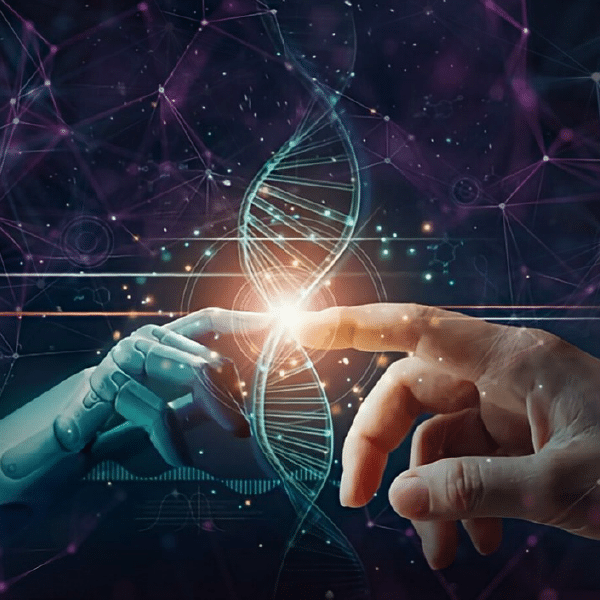A 2023 WordFinder survey found that one in four people use ChatGPT for work. Of those that use ChatGPT in the workplace, 41% use it for generating ideas and 20% use it for creating content. So, we experimented with ChatGPT and asked the chatbot to write us a blog post on the pros and cons of marketers using AI tools, and here is what it came up with.
ChatGPT’s Unedited Response:
In today’s fast-paced digital landscape, marketers are constantly seeking innovative ways to captivate their audience and stay ahead of the competition. Enter artificial intelligence (AI) tools, revolutionizing the marketing industry by assisting marketers in copywriting and strategy. With their ability to analyze vast amounts of data and generate valuable insights, AI tools have become indispensable allies for marketers. However, it’s important to explore both the advantages and drawbacks of using AI in marketing to make informed decisions.
Copywriting Assistance:
AI tools can provide valuable support to marketers in crafting compelling copy. These tools employ natural language processing (NLP) algorithms to analyze existing content, identify patterns, and generate engaging and personalized copy. This can save marketers considerable time and effort while maintaining consistency across various marketing channels.
Strategic Insights:
AI tools excel at data analysis, allowing marketers to extract meaningful insights from large datasets. By analyzing customer behavior, preferences, and demographics, AI can help marketers identify target audiences, optimize advertising campaigns, and make data-driven decisions. With AI-driven analytics, marketers can refine their strategies, personalize customer experiences, and maximize ROI.
Pros and Cons of AI in Marketing
While AI tools offer numerous benefits, it’s important to acknowledge the potential drawbacks. On the positive side, AI streamlines marketing processes, enhances efficiency, and enables marketers to deliver hyper-personalized experiences. However, relying solely on AI can risk losing the human touch, creativity, and intuition that marketers bring to the table. Additionally, AI tools may not always fully understand the context or cultural nuances, leading to inaccurate or insensitive content.
Taking Advantage of AI:
To harness the power of AI, marketers must strike a balance between automation and human expertise. Rather than replacing marketers, AI should be seen as a powerful tool to augment their capabilities. By leveraging AI’s data analysis and automation capabilities, marketers can focus on strategic thinking, creativity, and building authentic connections with their audience.
The Future of Marketing:
Undoubtedly, AI is reshaping the marketing landscape. As technology advances, AI tools will become increasingly sophisticated, enabling marketers to gain deeper insights, automate repetitive tasks, and deliver highly personalized experiences at scale. However, human creativity, empathy, and intuition will remain irreplaceable, ensuring a symbiotic relationship between marketers and AI.
Perks of AI Tools for Marketers:
Marketers embracing AI can enjoy increased productivity, improved targeting, enhanced customer experiences, and data-driven decision-making. AI tools enable marketers to adapt quickly to changing market dynamics, uncover hidden opportunities, and create impactful campaigns that resonate with their audience.
In conclusion, AI tools are transforming the way marketers approach marketing. By leveraging AI’s analytical capabilities, marketers can unlock valuable insights, streamline processes, and deliver highly targeted and engaging content. However, it is crucial to strike a balance between AI automation and human creativity to ensure marketing efforts retain their authentic and empathetic touch. With careful implementation, AI is poised to become an indispensable asset in the future of marketing.
ANDERSON’s Thoughts
Overall, ChatGPT wrote an impressive blog post in under thirty seconds. The AI bot answered all of our questions and even expanded on our ideas. The ideas ChatGPT came up with would have taken us way more than thirty seconds to research—let alone begin writing a blog post. Besides using AI for copywriting, marketers can also use AI tools for ad campaigns by optimizing their strategies to reach their target audience and improve their ROI.
What AI lacked the most were the human elements of creativity and personality. Marketers can use ChatGPT to get the ball rolling on ideas or when they’re strapped for time—but will need to go back and edit the copy for grammar, add a human element, and fact check. While AI can help marketers save some time, they will still need to invest time into editing, personalization, and fact-checking. All in all, AI tools should be used to complement the tools and strategies we’re already using—not replace them entirely. So, don’t worry, AI will not be taking your job anytime soon.
